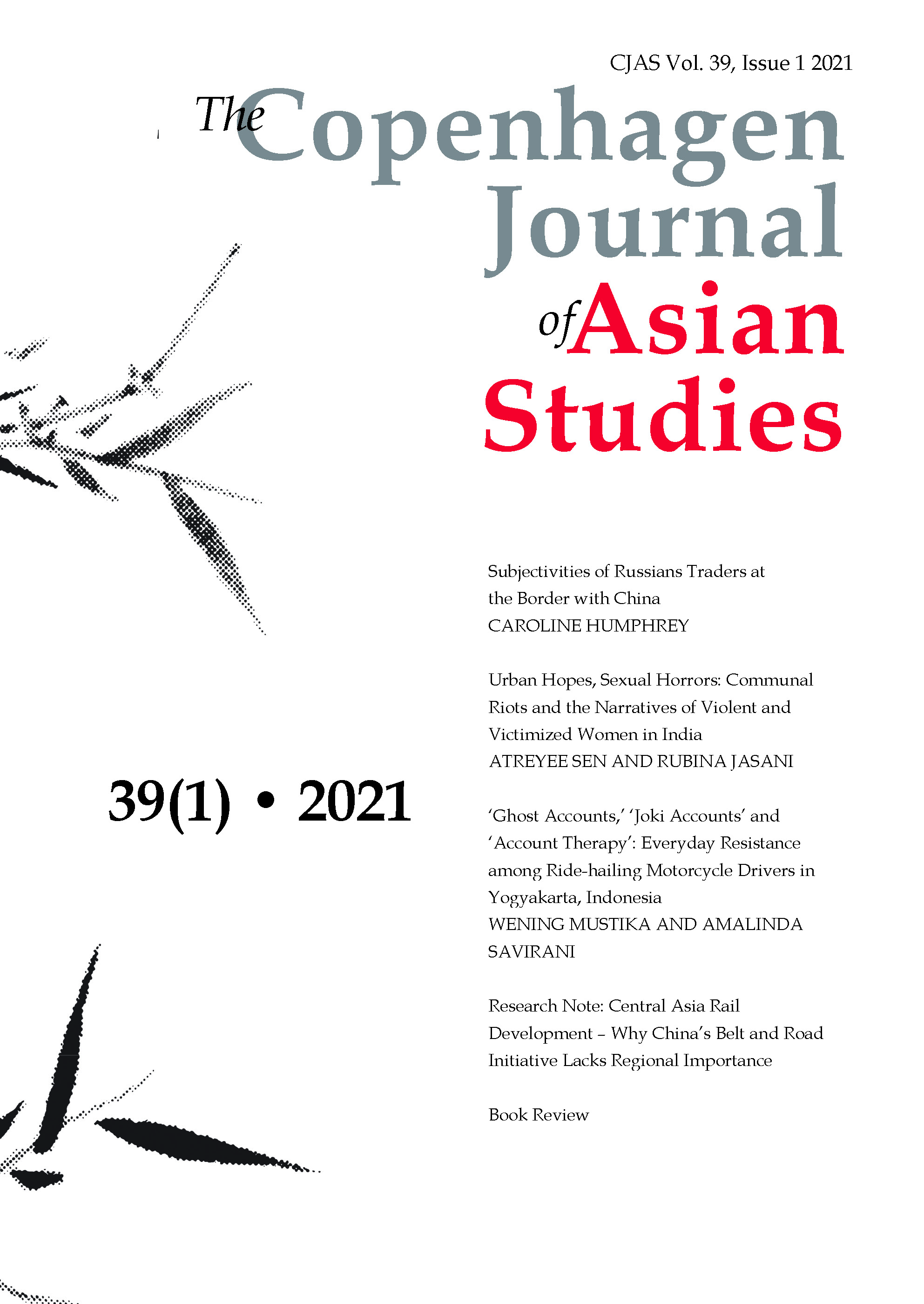Subjectivities of Russian Traders at the Border with China
DOI:
https://doi.org/10.22439/cjas.v39i1.6177Keywords:
shuttle-trade, materiality, qualia, imagination, self-reflectionAbstract
This paper draws attention to a relatively understudied aspect of cross-border trade: the relation between the subjectivities of traders and the geo-political situation they find themselves in. Among Russian traders at the border with China, discourses on comparative civilisation, memories of mid-twentieth century Soviet dominance and ambivalent appreciation of China’s present riches are integral to everyday practices. It is argued that a theoretical concept of melancholia is helpful to understand the traders’ self-reflective and diverse reactions. At this highly securitised border, in the absence of deep social relations with Chinese partners, the goods purchased, consumed and traded appear as vivid alternative foci for emotions. The article suggests that an anthropological approach to qualia (experiential feelings aroused by material objects) provide a useful heuristic for discussion in this situation.
References
Bassin, Mark, Sergey Glebov and Marlene Laruelle (eds.) 2015. Between Europe and Asia: The Origins, Theories and Legacies of Russian Eurasianism. Pittsburgh: University of Pittsburgh Press. https://doi.org/10.5823/jarees.2015.120.
Billé, Franck 2017. ‘Skinworlds: Borders, Haptics, Topologies’. Environment and Planning D: Society and Space 36 (1): 60-77. https://doi.org/10.1177/0263775817735106.
Caldwell, Melissa 2002. ‘The Taste of Nationalism: Food Politics in Postsocialist Moscow’. Ethnos 67 (3): 295-319. https://doi.org/10.1080/0014184022000031185.
Cassidy, Kathryn 2017. ‘Border Crossings, Shame and (Re-)Narrating the Past in the Ukrainian – Romanian borderlands’. In Donnan, Hurd and Leitloff-Grandits (eds.) Migrating Borders and Moving Times: Temporality and the Crossing of Borders in Europe. Manchester: Manchester University Press, pp. 58-79. https://doi.org/10.7765/9781526116413.00010.
Cherkaev, Xenia 2014. ‘On Warped Mourning and Other Omissions in Post-Soviet Historiography’. Ab Imperio 4: 365-385. https://doi.org/10.1353/imp.2014.0121.
Chumley, Lily Hope and Nicholas Harkness 2013. ‘Introduction: Qualia’. Anthropological Theory 13 (1-2): 3-11.
Clewell, Tammy 2004. ‘Mourning Beyond Melancholia: Freud’s Psychoanalysis of Loss’. Journal of American Psychoanalytic Association 52 (1): 43-67. https://doi.org/10.1177/00030651040520010601
Daucé, Francoise, Marlene Laruelle, Anne Le Huérou and Kathy Rousselet 2015. ‘Introduction: What Does it Mean to be a Russian Patriot?’ Europe-Asia Studies 67 (1): 1-7. https://doi.org/10.1080/09668136.2014.986964.
Donnan, Hastings, Madeleine Hurd, Carolin Leutloff-Grandits (eds.) 2017. Migrating Borders and Moving Times: Temporality and the Crossing of Borders in Europe. Manchester: Manchester University Press. https://doi.org/10.26530/oapen_626398.
Ermann, Ulrich 2013 ‘Fashioning Markets: Brand Geographies in Bulgaria’. In Duijzings (ed.) Global Villages: Rural and Urban Transformations in Contemporary Bulgaria. London: Anthem Press, pp. 173-190.
Fedorova, Kapitolina 2012. ‘Transborder Trade on the Russian-Chinese Border: Problems of Interethnic Communication’. In Bruns and Migglebrink (eds.) Subverting Borders. Wiesbaden: Verlag fur Sozialwissenschaften, pp. 107-128. https://doi.org/10.1007/978-3-531-93273-6_6.
Freud, Sigmund 1957 [1917]. Mourning and Melancholia. The Complete Psychological Works of Sigmund Freud. Vol. 14. London: The Hogarth Press.
Gobé, Marc 2001. Emotional Branding. New York: Allworth Press.
Goode, J. Paul 2018 ‘Everyday Patriotism and Ethnicity in Today’s Russia.’ In Kolsto and Blakkisrud (eds.) Russia Before and After Crimea: Nationalism and Identity, 2010-2017. Edinburgh: Edinburgh University Press, pp. 258-281. https://doi.org/10.3366/edinburgh/9781474433853.003.0012.
Humphrey, Caroline 2012. ‘Concepts of “Russia” and the Relation to the Border with China.’ In Billé, Delaplace and Humphrey (eds.) Frontier Encounters: Knowledge and Practice at the Russian, Chinese and Mongolian Border. Cambridge: Open Book Publishers, pp. 55-70. https://doi.org/10.11647/obp.0026.04.
Karpova, Elena 2007. ‘Making Sense of the Market: An Exploration of Apparel Consumption Practices of the Russian Consumer’. Journal of Fashion Marketing and Management 11 (1): 106-21. https://doi.org/10.1108/13612020710734436.
Lacaze, Gaelle 2012. ‘Prostitution and the Transformations of the Chinese Trading Town of Ereen’. In Billé, Delaplace and Humphrey (eds.) Frontier Encounters: Knowledge and Practice at the Russian, Chinese and Mongolian Border. Cambridge, Open Book Publishers, pp. 111-135. https://doi.org/10.11647/obp.0026.07.
Lash, Scott and Celia Lury 2007. Global Culture Industry: The Mediation of Things. Malden: Polity. https://doi.org/10.1017/s0008423908080931.
Lemon, Alaina 2013. ‘Touching the Gap: Social Qualia and Cold War Contact’. Anthropological Theory 13 (1-2): 67-88. https://doi.org/10.1177/1463499613483400.
Li, Ling 2012. ‘Technology Designed to Combat Fakes in the Global Supply Chain’. Business Horizons 56 (2): 167-77. https://doi.org/10.1016/j.bushor.2012.11.010.
Lin, Yi-Chieh Jessica 2011. Fake Stuff: China and the Rise of Counterfeit Goods. London: Routledge. https://doi.org/10.1177/1469540512456941.
Luhrmann, T. M. 2006. ‘Subjectivity’. Anthopological Theory 6 (3): 345-361
Manning, Paul and Ann Uplisashvili 2007. ‘“Our beer”: Ethnographic Brands in Postsocialist Georgia’. American Anthropologist 109 (4): 626-41. https://doi.org/10.1525/aa.2007.109.4.626.
Navaro-Yashin, Yael 2009. ‘Affective Spaces, Melancholic Objects: Ruination and the Production of Anthropological Knowledge’. Journal of the Royal Anthropological Institute (N.S.) 15: 1-18. https://doi.org/10.1111/j.1467-9655.2008.01527.x.
Peshkov, Ivan 2018. ‘The Trade Town of Manzhouli: Trust Created and Undermined.’ In Humphrey (ed.) Trust and Mistrust in the Economies of the China-Russia Borderlands. Amsterdam: Amsterdam University Press, pp. 121-142. https://doi.org/10.2307/j.ctt22zmbb1.9.
Pometkin, Grigorii 2010. ‘Samyi bol’shoi v mire rynok poddelok’. http://greenbag.ru/china/kitaiskii-rynok-poddelok. Accessed January 29, 2018.
Reeves, Madeleine 2013. ‘Clean Fake: Authenticating Documents and Persons in Migrant Moscow’. American Ethnologist 40 (3): 508-524. https://doi.org/10.1111/amet.12036.
Roberts, Graham H. J. 2016. Consumer Culture, Branding and Identity in the New Russia. London: Routledge.
Ryzhova, Natalia 2008. ‘Informal Economy of Translocations: The Case of the Twin City of Blagoveshchensk – Heihe’. Inner Asia 10: 323-51. https://doi.org/10.1163/000000008793066731.
Ryzhova, Natalia 2020. Integratsiya ekonomicheskikh migrantov v regionakh Rossii: formal’nyye i neformal’nyye praktiki. Irkutsk: Ottisk.
Stern, Dieter 2015. ‘“Nado minimum!”: Mediating Respectability at Informal Markets on the Russian-Chinese Border’. Inner Asia 17 (1): 5-30.
Yu, Hua 2012. China in Ten Words. Translated by Allan H. Barr. New York: Anchor Books.
Yurchak, Aleksei 2018. ‘Fake, Unreal, Absurd’. In Copeman and Da Col (eds.) Fake: Anthropological Keywords. Chicago: HAU Books, pp. 91-108.
Yuval-Davis, Nira, Georgie Wemyss and Kathryn Cassidy 2017. ‘Introduction to the Special Issue: Racialized Bordering Discourses in European Roma’. Ethnic and Racial Studies 40 (7): 1047-1057. DOI: 10.1080/01419870.2017.1267382.
Zhao, Jianhua 2013. The Chinese Fashion Industry: An Ethnographic Approach. London: Bloomsbury.


